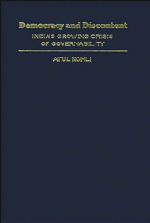Book contents
- Frontmatter
- Contents
- List of tables and figures
- Preface and acknowledgments
- PART I INTRODUCTION
- 1 An overview of the study
- 2 Some conceptual and theoretical considerations
- PART II THE GROWING PROBLEMS OF GOVERNING THE PERIPHERY: POLITICS IN THE DISTRICTS
- PART III ORDER AND BREAKDOWN IN THE STATES
- PART IV CENTRALIZATION AND POWERLESSNESS AT THE CENTER
- PART V FINAL INFERENCES
- Bibliography
- Index
1 - An overview of the study
Published online by Cambridge University Press: 05 June 2012
- Frontmatter
- Contents
- List of tables and figures
- Preface and acknowledgments
- PART I INTRODUCTION
- 1 An overview of the study
- 2 Some conceptual and theoretical considerations
- PART II THE GROWING PROBLEMS OF GOVERNING THE PERIPHERY: POLITICS IN THE DISTRICTS
- PART III ORDER AND BREAKDOWN IN THE STATES
- PART IV CENTRALIZATION AND POWERLESSNESS AT THE CENTER
- PART V FINAL INFERENCES
- Bibliography
- Index
Summary
Sooner or later all developing countries become difficult to govern, and over the past two decades India has been moving in that direction. This trend contrasts with the situation during the 1950s and 1960s, when India was widely regarded as one of the few stable democracies in the non-Western world.
India is still, of course, a functioning democracy, but increasingly it is not well governed. The evidence of eroding political order is everywhere. Personal rule has replaced party rule at all levels – national, state, and district. Below the rulers, the entrenched civil and police services have been politicized. Various social groups have pressed new and ever more diverse political demands in demonstrations that often have led to violence. The omnipresent but feeble state, in turn, has vacillated; its responses have varied over a wide range: indifference, sporadic concessions, and repression. Such vacillation has fueled further opposition. The ineffectiveness of repression, moreover, has highlighted the breakdown of the civil machinery intended to enforce the law and maintain order. In order to protect themselves, citizens in some parts of the country have begun organizing private armies. The growing political violence has periodically brought the armed forces into India's political arena, whereas the armed forces once were considered apolitical.
The purpose of this study is to describe how and attempt to explain why India has become difficult to govern. Was this outcome inevitable? India had long been considered something of a political exception.
- Type
- Chapter
- Information
- Democracy and DiscontentIndia's Growing Crisis of Governability, pp. 3 - 21Publisher: Cambridge University PressPrint publication year: 1991



